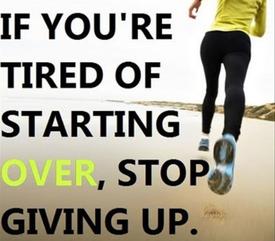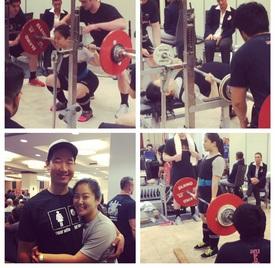Exercise Calories: To eat or not to eat... Results

psuLemon
Posts: 38,458 MFP Moderator
http://www.myfitnesspal.com/topics/show/708037-weight-loss-vs-fat-loss
So the question of whether or not to eat back exercise comes up fairly frequently, so I thought I would try to bring some light to it through statistics (oh yes, I am that nerdy math guy). Above is the thread created to gather information. The goal, was simple, what is better for weight/fat loss.... eating back exercise calories (or eating 20% below tdee) or sticking with the basic number MFP gives you and not eat back exercise calories. Below is what I looked for in order to derive the information
"I am looking for those who can provide starting weight (SW), start body fat (SBF), current weight (CW), current body fat (CBF) and what is your calories. I am trying to compare those who eat exercise calories (this will include those who eat 20% below TDEE) vs those who don't. If possible, I would like to collect 50-100 people if possible so I can make a good conclusion. "
With the above information, I was able to look at weight loss vs fat loss and the associated lean body mass loss. Lean body mass has signifacant purpose. LBM is what determines your metabolic rate (the more muscle you have the higher your metabolic rate, aka muscle burns fat).
" ... However, as a whole, lean body mass is responsible for providing the body with its "essential elements" for proper functioning, as the University of Texas Southwestern Medical Center states. The functions that these "elements" provide include movement, stability, respiration, digestion and immune system responses. However, while lean body mass is essential, body fat is still important..."
With this said, there were 48 people from MFP that were involved in this study. Below is the results
Does not eat back exercise calories
Weight Loss - 56.4
LBM Loss - 13.6
% of Loss - 24%
Max LBM Loss - 70%
Min LBM Loss - 1%
Max Weight Loss - 182.0
Min Weight Loss - 14.2
Eats back exercise calories (or 20% below TDEE)
Weight Loss - 34.1
LBM Loss - 5.0
% of Loss - 15%
Max LBM Loss - 45%
Min LBM Loss - 0% <-- there were several people who gained lean body mass but I will choke some of that up to calculation error.
Max Weight Loss - 104.5
Min Weight Loss - 1.0
So on average, a person will loss 9% more weight from lean body mass. But the thing that is astonishing is the difference between the min max levels. Some people lost as much as 70% of their weight from lean body mass. Additionally, about 66% of the people who did NOT eat back exercise calories lost 25%+ of their weight from lean body mass. Adversely, about 27% of those who ate back exercise calories lost 25%+ of their weight from lean body mass. I dont know about you, but that is pretty significant (39% difference).
So I hope this helps.. based on this, I would suggest eating exercise calories. The main benefit of it is preserving lean body mass, which will not only help maintain your metabolism but it will also fill out your skin and provide greater definition (see two links below)
http://www.nerdfitness.com/blog/2011/07/21/meet-staci-your-new-powerlifting-super-hero/
http://www.myfitnesspal.com/topics/show/392784-skinny-fat-vs-fit-photo?hl=skinny+fat+vs
Hope this helps you make your decision.
So the question of whether or not to eat back exercise comes up fairly frequently, so I thought I would try to bring some light to it through statistics (oh yes, I am that nerdy math guy). Above is the thread created to gather information. The goal, was simple, what is better for weight/fat loss.... eating back exercise calories (or eating 20% below tdee) or sticking with the basic number MFP gives you and not eat back exercise calories. Below is what I looked for in order to derive the information
"I am looking for those who can provide starting weight (SW), start body fat (SBF), current weight (CW), current body fat (CBF) and what is your calories. I am trying to compare those who eat exercise calories (this will include those who eat 20% below TDEE) vs those who don't. If possible, I would like to collect 50-100 people if possible so I can make a good conclusion. "
With the above information, I was able to look at weight loss vs fat loss and the associated lean body mass loss. Lean body mass has signifacant purpose. LBM is what determines your metabolic rate (the more muscle you have the higher your metabolic rate, aka muscle burns fat).
" ... However, as a whole, lean body mass is responsible for providing the body with its "essential elements" for proper functioning, as the University of Texas Southwestern Medical Center states. The functions that these "elements" provide include movement, stability, respiration, digestion and immune system responses. However, while lean body mass is essential, body fat is still important..."
With this said, there were 48 people from MFP that were involved in this study. Below is the results
Does not eat back exercise calories
Weight Loss - 56.4
LBM Loss - 13.6
% of Loss - 24%
Max LBM Loss - 70%
Min LBM Loss - 1%
Max Weight Loss - 182.0
Min Weight Loss - 14.2
Eats back exercise calories (or 20% below TDEE)
Weight Loss - 34.1
LBM Loss - 5.0
% of Loss - 15%
Max LBM Loss - 45%
Min LBM Loss - 0% <-- there were several people who gained lean body mass but I will choke some of that up to calculation error.
Max Weight Loss - 104.5
Min Weight Loss - 1.0
So on average, a person will loss 9% more weight from lean body mass. But the thing that is astonishing is the difference between the min max levels. Some people lost as much as 70% of their weight from lean body mass. Additionally, about 66% of the people who did NOT eat back exercise calories lost 25%+ of their weight from lean body mass. Adversely, about 27% of those who ate back exercise calories lost 25%+ of their weight from lean body mass. I dont know about you, but that is pretty significant (39% difference).
So I hope this helps.. based on this, I would suggest eating exercise calories. The main benefit of it is preserving lean body mass, which will not only help maintain your metabolism but it will also fill out your skin and provide greater definition (see two links below)
http://www.nerdfitness.com/blog/2011/07/21/meet-staci-your-new-powerlifting-super-hero/
http://www.myfitnesspal.com/topics/show/392784-skinny-fat-vs-fit-photo?hl=skinny+fat+vs
Hope this helps you make your decision.
0
Replies
-
Thanks for doing this!0
-
Awesome. Thanks for this. I must say the results do not really surprise me.0
-
Interesting! I am now doing the IPOARM so I basically eat my exercise calories back. Glad to hear it meshes with your results!0
-
I have to admit that if I disagreed with the conclusion I would point out that it doesn't control for time losing weight, macronutrients, etc... but since I agree, and I think it's awesome that you did this informal survey, and I hope this helps people get the body that they want.0
-
Quite an eye-opener with some interesting results for an informal survey - cheers! I'd also be interested in seeing a correlation between not eating back exercise calories but meeting protein macros calculated for muscle retention.0
-
bump0
-
I have to admit that if I disagreed with the conclusion I would point out that it doesn't control for time losing weight, macronutrients, etc... but since I agree, and I think it's awesome that you did this informal survey, and I hope this helps people get the body that they want.
I tried to keep it simple. There are a lot of variables that can affect weight loss/fat loss. Cardio vs WT vs HIIT, macronutrition, TDEE, hormones, etc... but this was an easy way to look at exercise calories vs not. Unfortunately, not everyone on this board tracks body fat during their weight loss..0 -
Awesome post. Thanks, PSUlemon! Bump :happy:0
-
Thank-you so much for putting in the work to shed some light on this!0
-
bump0
-
That is interesting because I never eat my exercise calories and I gained 1.5 lbs of lean body mass since last year according to DXA. That is a lot for a woman my age.
I guess everyone is different.0 -
Wow. I'm glad I checked out those two links.. I seriously need to stop worrying about the scale when objectively I know I know I look better/more toned than I did when I was a lower weight.. I've been fixated and weighing myself every morning and getting so upset that I'm not losing.0
-
So, did you find any significant variation in the results based on the participants age or sex. Any consideration to the type of exercise performed, i.e. cardio vs. strength training. Just curious, since I feel a bit older on the MFP scale of participants and was curious if there are any other factors that should be considered.0
-
Awesome!! Thank you for working the math out on this!!0
-
Very nice! You rock!0
-
That is interesting because I never eat my exercise calories and I gained 1.5 lbs of lean body mass since last year according to DXA. That is a lot for a woman my age.
I guess everyone is different.
Then I would ask, how many calories are you eating, what is your workout, what is your starting weight, starting body fat, current weight and current body fat. Also, when did you start your recent weight loss journey and when did you start your exercise routine. There are several variables or conditions that will allow for a person to increase lean body mass (noob gains, morbidly obese, or eating in a surplus). Also, there is also possibility of error (all methods have a % of error; water emersion, dexa, body fat calipers, bioimpedance, etc..). The bigger thing is evaluating trends. This is always why I labeled the min body fat loss at 0% for those who ate back exercise calories. There are several that gained lean body mass (more than fat loss) but then you have to understand if they did a bulk phase in between.0 -
So, did you find any significant variation in the results based on the participants age or sex. Any consideration to the type of exercise performed, i.e. cardio vs. strength training. Just curious, since I feel a bit older on the MFP scale of participants and was curious if there are any other factors that should be considered.
I didnt go into that much detail. I could take it to the next step but I have to see if I have enough time.0 -
i've tried eating a consistent # of calories but just recently switched back to eating back exercise calories b/c i found that it just works better for me. to each their own.0
-
Bump0
-
Very interesting! Chalk me up as another one who has essentially maintained all lean mass while losing weight, from 36.7% at 214, to 24-25% at 175, while almost always eating at least 50% of my exercise calories back.0
-
bump...0
-
bump0
-
bump0
-
Interesting!! Thanks for the analysis!! I'm going to go squeeze in another snack now..
 0
0 -
Thanks for confirming what I thought I had loosely figured out.
BTW - IMHO - Exercise calories taste awesome too.0 -
bump0
-
The results don't really mean anything without seeing what type of exercise was being done. Doing only cardio and/or light weight resistance training is going to cause you to loose more lean body mass than lifting heavy. Nevertheless it still interesting to see the differences.0
-
bump0
-
So if I want to burn muscle efficiently, I should try to maximize my calorie deficit? Got it, thanks
 0
0 -
Bump0
This discussion has been closed.
Categories
- All Categories
- 1.4M Health, Wellness and Goals
- 398.5K Introduce Yourself
- 44.7K Getting Started
- 261K Health and Weight Loss
- 176.4K Food and Nutrition
- 47.7K Recipes
- 233K Fitness and Exercise
- 462 Sleep, Mindfulness and Overall Wellness
- 6.5K Goal: Maintaining Weight
- 8.7K Goal: Gaining Weight and Body Building
- 153.5K Motivation and Support
- 8.4K Challenges
- 1.4K Debate Club
- 96.5K Chit-Chat
- 2.6K Fun and Games
- 4.8K MyFitnessPal Information
- 18 News and Announcements
- 21 MyFitnessPal Academy
- 1.5K Feature Suggestions and Ideas
- 3.2K MyFitnessPal Tech Support Questions
























